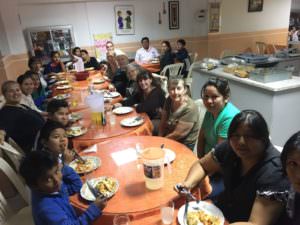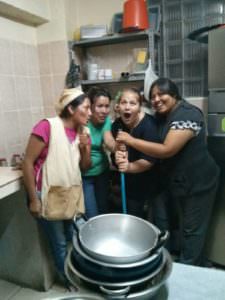The Privilege of Options

Editor’s note: Missioner Catherine Hope Sullivan reflects on her two years in Bolivia and shares her reflective thoughts on the transition to returning home.
As my two years here in Bolivia come to a close (I cannot believe I am typing it, but today marks one month until departure), I have found myself constantly reflecting on how much I have learned from the friends I have made here, and on how I can make sure to carry those lessons with me back to the US and beyond. The more I reflect, the more one bright truth shines through more than others, and I want to pass it on, from these amazing Bolivian women, to all of you.
 Many of my closest friends here are, among other things, very hard workers. They do whatever they have to do to take care of their children- put food in their mouths, and clothes on their bodies, and some sort of cover over their heads. Most of my friends in the women’s prison (and many of my friends outside) have very limited options for making money to do so. Often, they will spend 12 hours a day knitting and sewing in order to make ends meet. When they get out, they take any job opportunity they can find, and work as much as possible.
Many of my closest friends here are, among other things, very hard workers. They do whatever they have to do to take care of their children- put food in their mouths, and clothes on their bodies, and some sort of cover over their heads. Most of my friends in the women’s prison (and many of my friends outside) have very limited options for making money to do so. Often, they will spend 12 hours a day knitting and sewing in order to make ends meet. When they get out, they take any job opportunity they can find, and work as much as possible.
A few times, as friends do, we sat together and talked about our dreams. Mostly, I listened. I listened as Anamaria told me that she hopes to live long enough (she has cancer) to finish paying for her son’s degree. I listened as Marta told me that she hopes she can find two jobs when she gets out (one in the morning, and one in the evening) so that she can afford a place where her kids can have a separate room from her in the apartment. I listened as Ruth told me that she hopes she dies in the prison so that shedoesn’t have to burden her children, and can give any money she earns to them. I listened as Prima told me she dreams of finding a part-time job that pays well enough so that she can spend the afternoons with her children after they get out of school. And in those conversations, once again, I was confronted by my own privilege. Only this time, it was also a privilege of options.
When I get home next month, I am moving in with my sister and brother-in-law, and I will be living with them rent-free, with my own room, and my own car, and no concerns with how to get food or anything else I will need.
With those needs taken care of, I am looking at graduate programs in Social Work. So many schools. So many scholarships. So many loan programs, free programs, options of night classes, and online classes.

I am also looking at jobs, and again there are so many options: little pay, more pay, big corporations, and local businesses. Jobs in so many cities and so many towns, both international and national.
Then there is the search for apartments, furniture, appliances, volunteer opportunities, internships, restaurant jobs–everything. Everywhere I look, all I see is my privilege of options- from the number of cereal options in supermarkets, to the number of community colleges, to the number of realtors. With all those options, I’m reminded that most often, in our US culture, we are drawn to what is most competitive and most prestigious–the option available to the least amount of people- because that, to us, is more of an accomplishment, more of a prize; an option for fewer people in a place where options abound.
And yet, I have had so many conversations with friends from the US and Europe (to make it clear, this is by no means all people, but rather a pattern I have witnessed) who talk about how miserable they are in their jobs, in their cities, in their relationships, and in their lives—almost as if they are bragging, proudly listing off how much they’ve worked that week; explaining how much their significant other drives them crazy and doesn’t help around the house; and detailing how little they slept, how infrequently they remember to eat, etc.

The things is, all of them have other options. But they stay for the so-called prestige of working for a larger company in a
bigger city, of having a nicer apartment in a nicer neighborhood, of working longer hours at a well-known firm, and of having the bragging rights to say that they are the busiest.
Here, I have learned to look at my privilege of options differently—to look at it as more of a responsibility. I can see how
often we forget to put life first and to choose life above work. Now, with each option with which I am confronted, I want to look at it with the eyes of my friends here, with the eyes of self-sacrifice and family-
commitment. I do not want to choose the most competitive, most prestigious option, I want to choose the option that will bring real joy, that will benefit the most people, that will benefit the people most precious to me, that will provide me with the bare necessities, and that will still leave space and time for friends, family, celebrations, cooking—basically, all of LIFE.
When I leave Bolivia next month, I will honor my friends here by living with their lesson in my heart: to never take opportunities for granted and to CHOOSE the option with the greatest potential to bring true happiness.
*The names have been changed in this article in order to protect the identities of those mentioned.
Reflection question: What are some of the choices or options you have in your life right now?
Tagged in:

